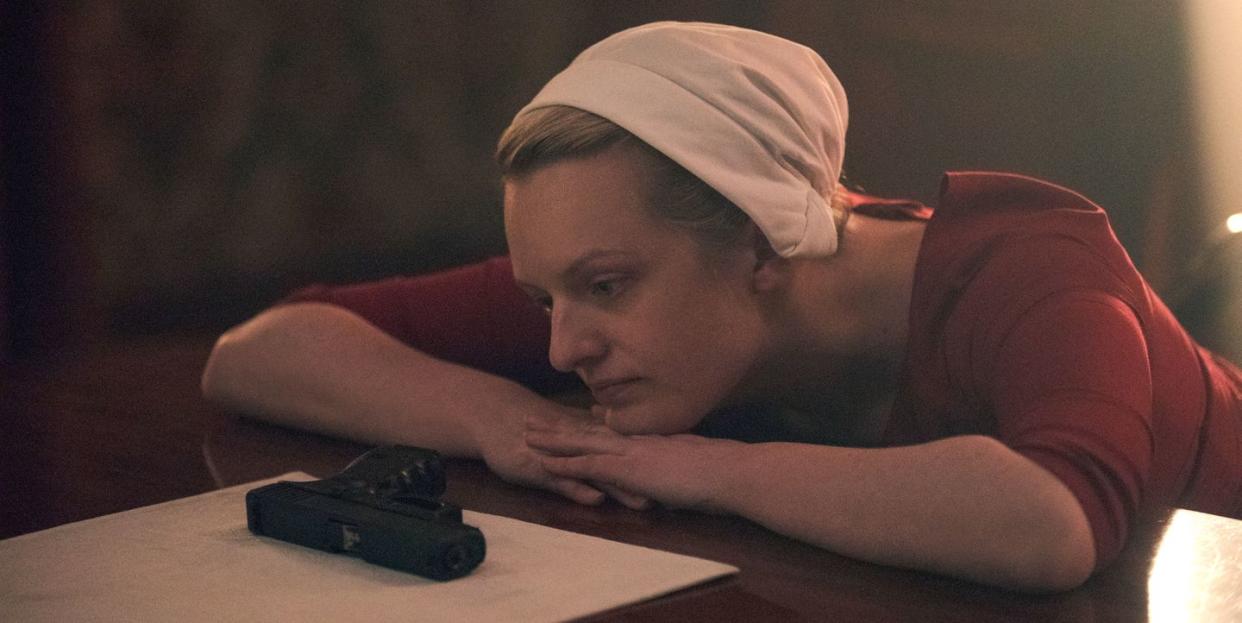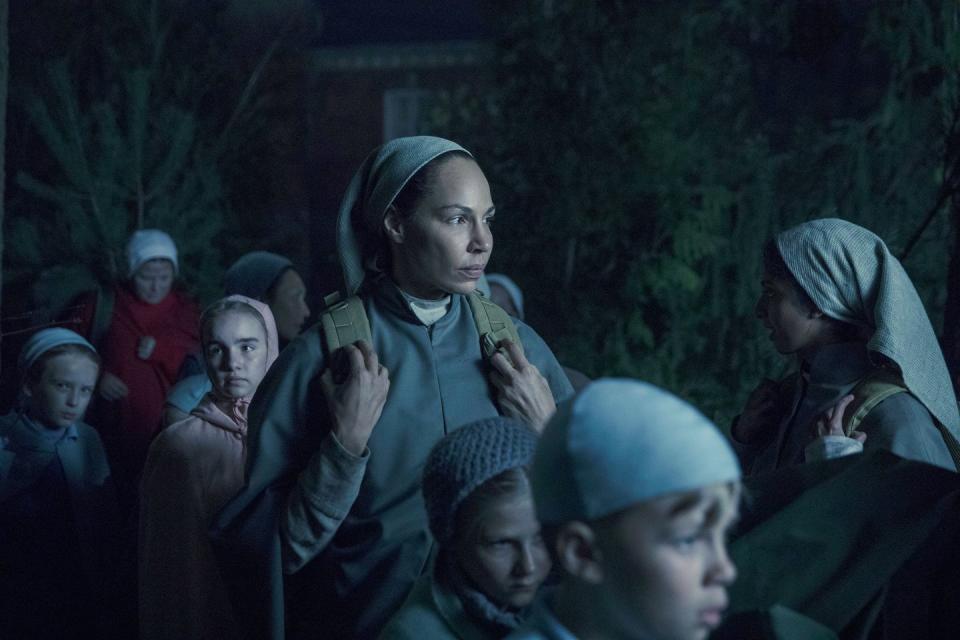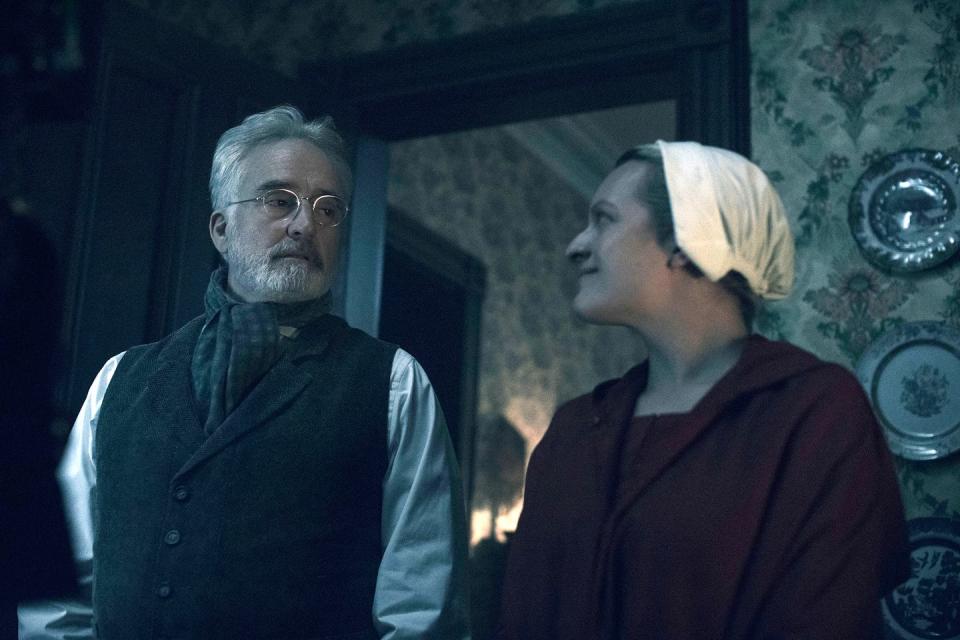'Handmaid's Tale' Showrunner Breaks Down "Ruthless" Finale

The Handmaid's Tale is never going to be an easy or comforting watch, but the show's last few episodes crammed in several deeply cathartic moments, as June (Elisabeth Moss) completed her transformation from quiet Gilead dissenter to outright revolutionary. Two episodes ago, she stabbed Commander Winslow (Christopher Meloni) to death with his own pen rather than submit to another rape. Fred Waterford finally got his comeuppance, and belatedly, so did Serena. Though she seemed to have bargained herself into a relatively cushy post-Gilead life in Canada, she was arrested in the finale for forcing Nick to impregnate June back in Season 1.
After all of these smaller victories, Season 3 wraps up on a colossal one, as June and the Marthas put into motion the incredibly high-risk plan they've been working on for several episodes: Successfully flying more than 100 children out of Gilead to safety in Canada. And just like in last season's finale, June herself stays behind while another woman—this time Rita (Amanda Brugel)—accompanies the children across the border.
Showrunner Bruce Miller sat down with BAZAAR.com to dig into June's newfound ruthlessness, how the very different deaths of Commander Winslow and Eleanor Lawrence impacted her, and his plans for Season 4.
There are a lot of threads to tie up in this finale. What was the overarching thing you wanted to leave viewers with at the end of the season?
June’s arc this season has been becoming a rebel—learning what that is and the moral sacrifices that takes. That all culminates with a runaway train feeling, where sometimes it feels great because it’s gonna happen whether you do it or not, and other times it feels awful because the train’s moving ahead and it’s falling apart and it’s all on you. In the finale, I wanted June to have an experience that would tie together all the threads of things she’s learned this season. It would be a test of whether she’s ruthless enough to really hurt Gilead, because Gilead was so ruthless in hurting her. Is she as ruthless as they are?
We’ve seen what happens when one child is kidnapped. Now that a bunch of children have been kidnapped, is it fair to assume the fallout is going to be exponentially worse?
I can't imagine that all hell isn't going to break loose. Gilead thinks of them as their children, and also the most valuable resource in their world. But I also wonder how Gilead is going to play it. How weak does it make you look to the world if you can't even keep track of what ends up being probably 165 children? It might be beneficial for them to try to keep it quiet. Whenever we think about Gilead and what their government would do, we start with conversations with the UN about how decisions are made in pariah nations and enclosed nations that control all the information coming out of them. We'll start by talking to people who actually know the answers to those questions, and then we can fictionalize from there.

The finale begins with a flashback to June in the moments after she was first taken. We haven’t seen a lot of that time period this season. Why did you choose to begin there?
We’ve previously seen a lot of little pieces of that time. We've seen her running through the woods, we’ve seen her arrive at the Red Center, we’ve seen her get her ear tagged. I find it personally fascinating to fill out that little bit. It’s also showing the turn from June, the woman living in Brookline, to June, who's stabbing Chris Meloni to death. You want to see where she was at the beginning.
Also, she's not a soldier, and she's trying to figure out how to do it. So, she looks back, and it's interesting that she would take inspiration from the soldiers of Gilead on how to fight. She asked someone for help and they said, "close your mouth." That moment of realization that someone could be that ruthless, that non-empathetic, was a revelation for June. So she thinks back and she's like, Okay, what did they do? Because I want to do it. It’s not, Oh my god, that's horrible and I was in a bad situation. Now she's looking at a memory and saying, I want to be just like them. I want to be able to do what they do. I am just like them. I am ruthless.
June shooting the guardian in the head after reassuring him was particularly striking after she killed Commander Winslow, then let Eleanor die in last week’s episode.
There’s so much moral compromise she has to make along the way, and there's so many rules she has to break. Her relationship with murder is really complicated. She doesn't want to cross that line, but then she's been crossing it over and over and over again. It's not like there's this rubicon where after you've crossed it, you're this murderer and you've changed. It’s also not going to be just once. This is the job if you want to be a rebel, and so rebel is just a nice word for soldier.
With Winslow, that was a violent, visceral response to someone touching her body. The key thing in that scene is she can’t control the response, and she thinks she can because she's controlled it for so long. But she's done with that particular activity [the Ceremony], and I don't think she's going to let anybody touch her. Also, Winslow is so abhorrent that she just kind of snaps when he touches her.
There’s something very cathartic about the violence of that scene.
She’s not an idiot. She’s strong and scrappy but she’s also petite, and he’s very big. She would not have attacked unless he had kind of come after her. My favorite thing about that scene is every knife stab is a decision. Once he gets off of you, you’re making a decision every time you stab that little pen into him. She could have stopped at any point and didn't because she was lost in her fury.

Whereas with Eleanor, it almost feels like a mercy.
Right, because Eleanor is someone you like and has treated you with kindness. You feel like she's a victim in this place. You don't feel that same viciousness. But if you're talking about someone who deserves to die—if there is a good way to deserve to die—maybe Eleanor has earned that. She's certainly not killing herself because of her mental illness. She’s actually killing herself at the cusp of getting her mental illness treated, because she doesn't want to live with what she's done in Gilead. She's handled her poorly-medicated mental illness very well, because it’s hard when someone takes away all your meds, but it’s when that’s about to come to an end, when she's about to get the support she needs and feel like herself, that she wants to end it. She's like, I don't want to feel like myself and have this on my conscience. Both of these deaths are cases where people die in exactly the way they have earned. She dies very peacefully. He dies very violently. Sometimes you get the death you earned.
Looking ahead to next season, a lot of the Gilead power players we know, like the Waterfords and Commander Winslow, are out of the picture. What are your plans for sustaining that side of the show?
Boy, we’ve really screwed ourselves haven't we? I better get to work! I try really hard not to plan how to get out of the problem I'm giving myself, because I feel like an audience member could totally smell that, if I'm setting up how I'm going to get out. She could see that escape hatch a mile away.
When I think about how I want to end the season, I try to figure out whether I can come up with one or two things to happen next, and then I don't think any more until we're done. You just want to know that there's a way onto the next story piece. Also, Elisabeth Moss leads us by her performance. We write a scene and she adds so much to the scene that it would be asinine for us to plan exactly what's going to happen after that. We don't know what else she's going to add to the scene that we can latch onto.
You Might Also Like

